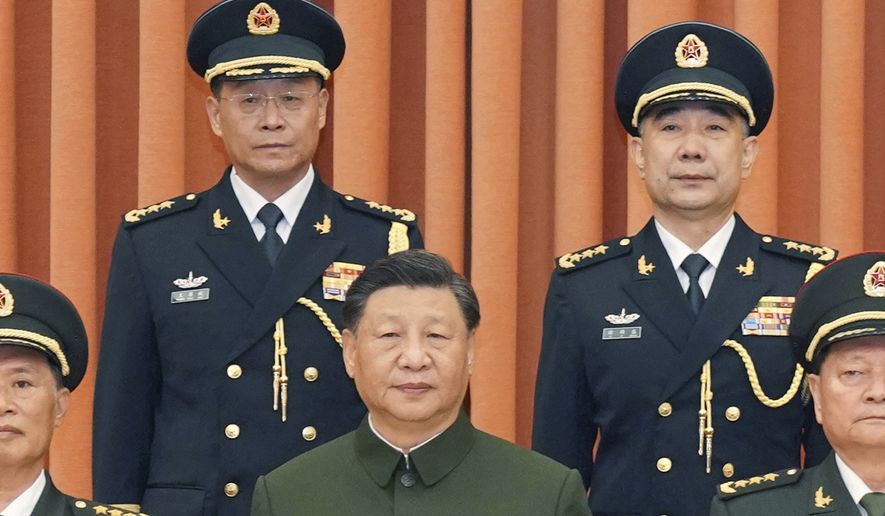China’s ruling Communist Party has appointed new leaders for the defense body that controls the country’s fast-growing nuclear arsenal, in the biggest shake-up of Beijing’s military leadership in years.
President Xi Jinping has replaced two leaders of the elite People’s Liberation Army (PLA) Rocket Force unit, which oversees a nuclear weapons arsenal. U.S. officials say the arsenal is slated to expand dramatically over the coming decade.
The abrupt shift in leadership of the Rocket Force has triggered speculation of a purge. Mr. Xi chairs the Communist Party’s top defense command — the Central Military Commission — and is seeking to consolidate his control over the PLA.
The development comes just weeks after the still-unexplained ouster of Chinese Foreign Minister Qin Gang, who was replaced by his predecessor Wang Yi after going suddenly absent from public view for a month. The Xi government has not stated why it replaced Mr. Qin.
The shake-ups come as the Pentagon struggles to gain insight into Mr. Xi’s blueprint for China’s defense sector or for the future of U.S.-China military relations.
Assistant Secretary of Defense Mara Karlin told reporters at a Defense Writers Group forum Tuesday that Beijing is still refusing to take calls from senior leaders in the Pentagon even as bilateral tensions mount over Taiwan, the South China Sea and other flashpoints. Secretary of Defense Lloyd Austin has sent Chinese military officials multiple requests for open communications, with no success.
“It’s really important that the most senior folks can talk to each other as quickly as possible when something happens. So, Secretary Austin keeps asking for that,” Ms. Karlin said. China “has not been enthusiastic about that, and I think that’s really problematic.”
Other administration officials, including Secretary of State Antony Blinken and Treasury Secretary Janet Yellen, traveled to Beijing last month for high-level, fence-mending talks.
Regarding the Chinese nuclear agency, the official People’s Daily Online reported Monday that Wang Houbin, the Chinese navy’s former deputy commander, will become the new head of the Rocket Force, and that Xu Xisheng, formerly of the PLA’s Southern Theater Command, will become the force’s new political commissar. The report, included a picture of Mr. Xi and the two newly promoted generals in a group photo, did not mention the military officials who had been replaced.
The South China Morning Post said sources speaking on background said the Central Military Commission’s anti-corruption unit is investigating former Rocket Force commander Li Yuchao, as well as his current and former deputies Zhang Zhenzhong and Liu Guangbin.
Asia Society Policy Institute fellow Lyle Morris told the BBC that “purge” of the Rocket Force Unit leadership comes as China “is undertaking one of the most profound changes in nuclear strategy in decades.”
Mr. Xi “has consolidated control of the PLA in unprecedented ways, but that doesn’t mean it’s complete. Xi is still worried about corruption in the ranks and has signaled that absolute loyalty to the [party] has not yet been achieved,” he said.
A U.S. military report last year said China is expanding its nuclear force and is on pace to nearly quadruple the number of warheads it has over the coming 12 years.
The Pentagon report said China has about 400 nuclear warheads, and that number could grow to 1,500 by 2035, on pace to enable Beijing to match or surpass U.S. global military power by midcentury.
The United States has 3,750 active nuclear warheads, according to The Associated Press. Both the Trump and Biden administrations have pressed Beijing to join in arms limitation talks, but to date China has refused the offer.
Despite the lack of direct military contacts, China briefly opened communications with Washington last week to lodge a protest over a new U.S. $345 million security package for Taiwan. It’s the first time military assistance has come through presidential drawdown authority, which means weapons and equipment will be drawn directly from U.S. military storerooms.
“The U.S.’ act of providing military aid to China’s Taiwan region grossly interferes in China’s internal affairs, seriously undermines China’s sovereignty and security interests, and gravely threatens peace and stability across the Taiwan Strait,” Col. Tan Kefei, spokesman for China’s Ministry of National Defense, said Tuesday during a press conference.
• Mike Glenn contributed to this story.
• Guy Taylor can be reached at gtaylor@washingtontimes.com.




Please read our comment policy before commenting.